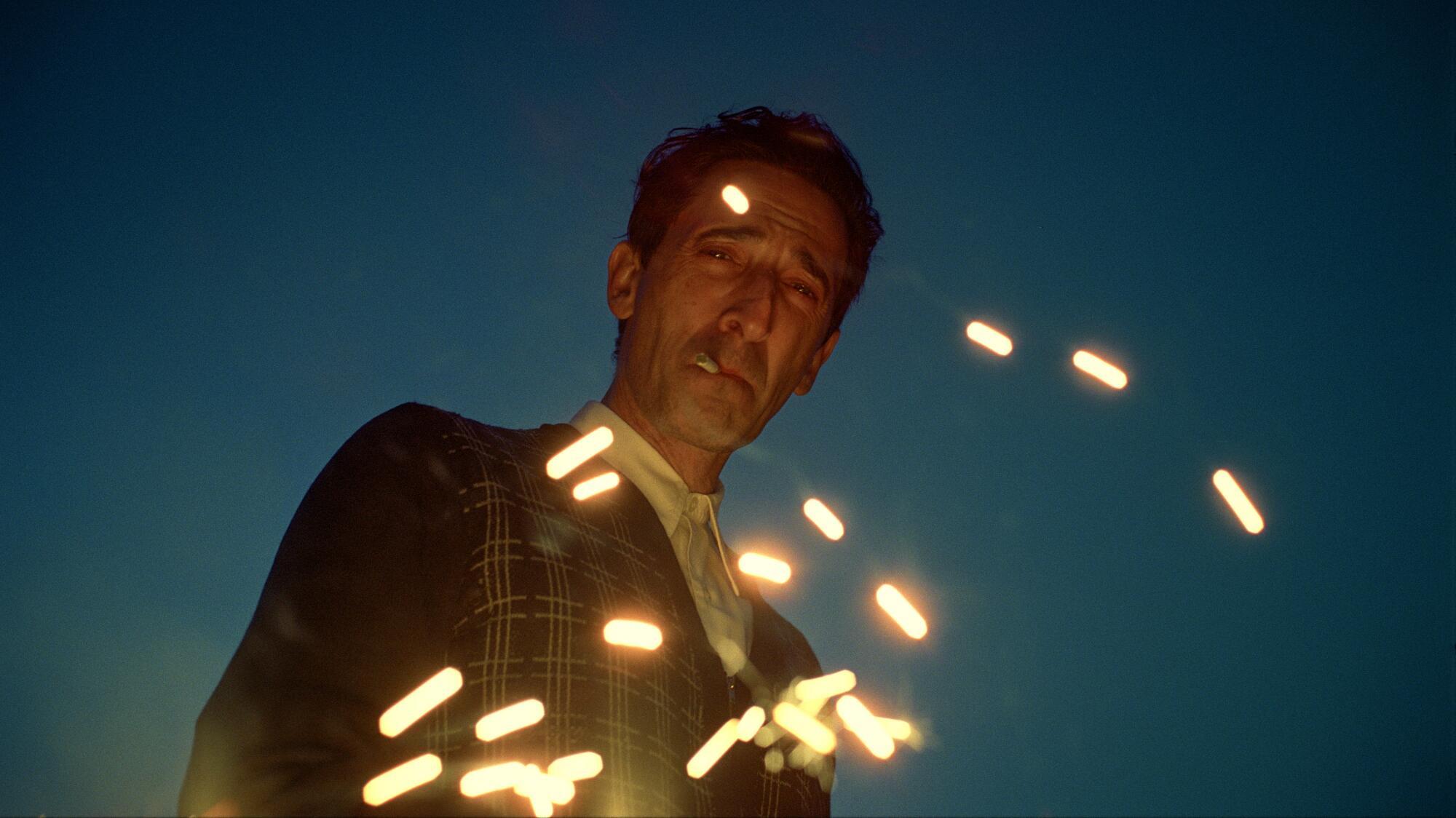From such Oscar winners as 1947’s “Gentleman’s Agreement,” 1959’s “The Diary of Anne Frank” and 1965’s “The Shop on Main Street” to latter-day titles including “Schindler’s List,” “The Pianist” and “A Serious Man,” Jewish-themed films have long enjoyed a key niche in the awards circle.
As evidenced by this list, Holocaust-era dramas often have competed for the gold, but other types of movies with integrally Jewish lead characters and situations — such as “Funny Girl,” “Fiddler on the Roof,” “Call Me by Your Name” and “The Fabelmans” — also have made their mark around Oscar season.
This year, there has been a particularly wide array of features highlighting the Jewish experience — both fact-based and fictionalized — that are likely to be center stage come awards time. And they have arrived at an essential moment in Jewish history after last year’s Oct. 7 attack by Hamas on Israel, increased concerns about antisemitism worldwide and, as a result, a renewed sense of Jewish pride.
To that end, there is a “never forget” aspect to many of the films in this current trove. Such historically inspired pieces as “The Brutalist,” “Lee,” “White Bird: A Wonder Story” and the documentaries “The Commandant’s Shadow” and “Riefenstahl,” plus the contemporary dramedy “A Real Pain,” all feature echoes of the Shoah. Then there’s “September 5,” which returns us to the fatal assault on Israeli team members by Palestinian terrorists at the 1972 Munich Summer Olympics.
On a lighter note, there’s the odd-couple comedy “Between the Temples,” the nonagenarian-grandma caper “Thelma” and the documentary about Jewish comic actor “Remembering Gene Wilder.” One could even count “A Complete Unknown,” the biopic of music legend (and briefly lapsed Jew) Bob Dylan, as a member of this overall group.
Even if this surge of Jewish-oriented pictures might be more coincidence than full-fledged cinematic movement, the question remains: Why now, and where do these films fit into the zeitgeist?
“It’s impossible to predict what will happen in the world that will ultimately contextualize something you’ve written two years prior,” says “A Real Pain” writer-director-star Jesse Eisenberg by email, calling his film “a character-centric story that makes sense in today’s climate. But it’s also a story that could have taken place at any time in the past 35 years.”
The filmmaker adds, “But I’m also not blind to the current moment — where a lot of American Jews are dealing with very conflicted feelings about global events, their own identity, and experiencing greater attention and scrutiny.”
As a result, viewing the film takes on a special resonance, as does “Remembering Gene Wilder,” which screened in festivals and, later, theatrically after the onset of the Israel-Hamas war.
That movie’s writer, Glenn Kirschbaum, recalls, “As we began putting the film together, it became increasingly clear that there were many Jewish themes that ran through it. Then, the events of October 7 took place, and the film became more meaningful to all of us.” He continues, “We came to see it as a source of laughter in a time of great sorrow. And a tribute to a positive and much-loved Jewish personality in a time of ever-increasing antisemitism.”
Ron Frank, the documentary’s director, says, “Films and TV have always had a special responsibility in portraying Jewish themes and history.” He adds, “Considering the centuries of antisemitism we’ve endured, it makes sense to tell our stories and have them seen and heard to educate and inform in an attempt to reverse ignorance and hate.”
Carol Kane, Oscar-nominated for her performance in Joan Micklin Silver’s 1975 Jewish immigrant tale “Hester Street” and co-star (as a late-blooming bat mitzvah student) of 2024’s “Between the Temples,” believes that presenting characters in Jewish-centric movies with individuality is also important.
“The more the characters involved in the stories are explored in some depth in regards to their uniqueness, and not in a kind of cliched definition or portrayal, [helps],” the actor says in a recent phone chat. “Each Jewish person is as different as each person of any faith — or persons out of faith.”
Regarding the current wealth of Jewish-themed films, she adds, “There might be some underlying need right now to step up and be counted.”
Here’s a closer look at three of this season’s leading award-worthy films and their connections to Judaism and Jewish history:

“The Brutalist”: Director and co-writer Brady Corbet’s epic look at Jewish emigration and assimilation stars Oscar winner Adrien Brody (“The Pianist”) as László Tóth, a Hungarian Jewish architect and Holocaust survivor who comes to the U.S. in 1947 in search of the American Dream. Guy Pearce co-stars as a mysterious, antisemitic industrialist who changes the ambitious László’s life; Felicity Jones plays László’s resilient wife. The acclaimed film’s stirring Yom Kippur scene has been compared to the iconic baptism sequence in “The Godfather.”

“A Real Pain”: Writer-director Jesse Eisenberg and Kieran Culkin, in perhaps career-best performances, play mismatched Jewish cousins whose push-pull dynamic plays out in both funny and affecting ways as they travel to Poland to visit the childhood home of their beloved late grandmother, a Holocaust survivor. The film, which includes a wrenching visit to the Majdanek concentration camp, is deftly peppered with insightful strands of Jewish history and culture.

“September 5”: Though it’s not the first film to revisit the hostage crisis at the 1972 Summer Olympic Games (Steven Spielberg’s “Munich” and Kevin MacDonald’s “One Day in September” were both lauded portraits), director and co-writer Tim Fehlbaum’s new take is a propulsive, behind-the-scenes look at the ABC Sports team and its landmark live coverage of the Munich massacre. The ongoing Israel-Hamas conflict makes this movie regrettably timely.